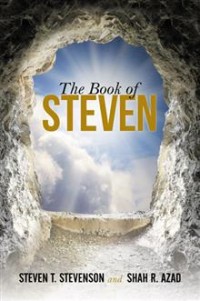Title: The Book of Steven
Author: Steven T. Stevenson and Shah R. Azad
Publisher: iUniverse
ISBN: 9781491756164
Pages: 284
Genre: Fiction / Religious / General
Reviewed by: Allison Walker
Buy on AmazonPacific Book Review
The Book of Steven opens a stream of verbalized consciousness. The character Steven has just awakened in Heaven, finding himself much disoriented and totally helpless. He instinctually utters a gratuitous amount of swearing along with mouthfuls of anxiety releasing comments.
As roughly ninety-five percent of the novel is constructed of imaginative dialogue, some vocalized pauses are necessary to demonstrate the realism of the conversations. Likewise, the embedded swearing builds realism to the characters and a lot of the slang and cursing makes the personalities more relatable. However, especially in the first two chapters, much of it is superfluous to the text and does not contribute to the substance of the story, which in my opinion could certainly have been omitted.
Stevenson and Azad do well to place precautions throughout the book – much of the novel should be accompanied by a large TRIGGER WARNING sign. The authors approach the story with a no-holds-barred response to suicide; using graphic, often insensitive phrases to describe the main character’s struggles. The harsh metaphors of Steven’s death play well to the hard moral of the story; that suicide is a waste of opportunity, of life, and ultimately hurts everyone involved. Stevenson and Azad don’t want to romanticize or sympathize suicide, as they want to wake readers up to the pain of self-destruction.
When it comes to content, it is the character Steven’s conversations with God that secure the moral of the story in the reader’s mind. Together, Steven and God engage in lengthy discussions, many of which serve as metaphors for the lessons Steven must learn during his stay in Heaven. For example, the extinction of the dinosaurs is not only explained but also used as a metaphor for giving up the childish things in life.
While in Heaven, Steven is tasked with learning how to think. Like many people, he doesn’t truly understand the challenge at hand. He spends plenty of time thinking – thinking lengthy thoughts about nothing in particular. Steven’s conversations with God, laden on philosophical truisms, are interleaved with humor. Many of the main character’s interactions with Jesus offer even more by way of comic relief. When you go to Heaven, don’t tell Jesus anything was a pretty heavy burden for you to bear… He’ll take you literally. They don’t joke around like that in Heaven. But joking around with Jesus in the book gives readers time to relax and digest the new ideas God introduces.
The true value of Steven’s character is he is an ordinary guy, the “Regular Joe,” someone that readers can easily relate to. Like us all, Steven makes mistakes, and like us all, he must then learn from those mistakes. Although fiction, any conversation with God certainly has an intrinsic curiosity value, and The Book of Steven satisfies that deeply rooted desire to go beyond what is humanly possible. This creative work will linger in the reader’s mind long after being finished, as was the intent.



Follow Us